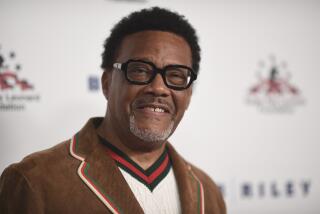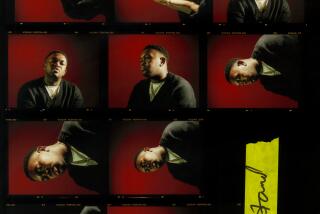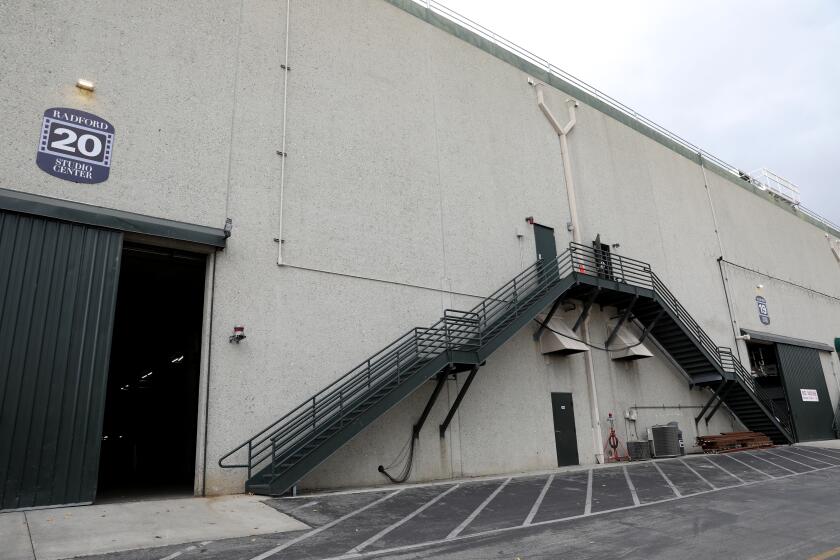The Very Model of a Modern Media Manager
John Billock, second in command at AOL Time Warner Inc.’s cable unit, can’t forget the day he and Jeff Bewkes tried to sail the 20-odd miles from Martha’s Vineyard to Nantucket Island back when they were executives at HBO.
They set out in a small boat with no motor or compass. After five hours fighting dead-on winds in shoals, fog and heavy water, Bewkes declared: “Look, we’re only halfway. We can keep going, but chances are 50-50 that we’re going to die.”
Howling with laughter, he added: “If we don’t make it, how extraordinary is that?”
The pair sailed on for 10 hours, never reaching the island. They drifted back to safety early the next day -- with Bewkes still laughing. That, Billock said, was vintage. “He doesn’t take himself and obstacles that seriously.”
Unusual aplomb is one of the gifts that carried Jeffrey Bewkes from the relative security of HBO, where he spent virtually all of his 26-year career, to the perilous top of show business management as head of AOL Time Warner’s massive entertainment and networks group.
Now the unflappable executive must prove he can really navigate hazards, beginning with angry venting by shareholders at the company’s annual meeting today in Landsdowne, Va. Whether he can beat such threats as digital piracy, shifting competition and pressure to reduce debt will determine whether AOL -- and perhaps the industry at large -- prospers under a new generation of corporate managers who are fast replacing the last wave of entrepreneurs and builders.
Bewkes “has all the abilities I have and more,” said Richard Parsons, 55, who will become AOL’s chairman at the meeting, capping a year of executive departures and $100 billion in losses.
Born to the East Coast elite, Bewkes, who is MBA-equipped and a corporate loyalist, is a novelty in the entertainment industry.
A disciplined, well-ordered personality, he has just enough flair to prosper in a sometimes unruly business. He may well represent the new “organization man” -- the kind of person more likely to run media corporations of the future than such Hollywood-bred players as Walt Disney Co.’s Michael Eisner or moguls such as Viacom Inc.’s Sumner Redstone.
“He’s a good model for the modern-day manager in entertainment,” said Tom Freston, Viacom’s MTV Networks chief.
The tall, graying and whip-thin Bewkes, who turns 51 this month, is barely known to a public that has savored programs -- including “The Sopranos” and “Sex and the City” -- born during his seven years as HBO’s chief executive.
But his promotion in July made him one of the entertainment industry’s most powerful figures, with a portfolio that includes such properties as Warner Bros., New Line Cinema, Warner Music Group and CNN.
Bewkes declined to be interviewed. Associates said that was because of the delicacy of his position as AOL tries to shake off the rough internal politics of its recent past while confronting problems that include a Securities and Exchange Commission investigation of possible accounting irregularities at the company’s online unit, which Bewkes doesn’t oversee.
Bewkes can be blunt-spoken almost to the point of self- destruction, as when he is said to have advised then-boss Gerald Levin to scrap Time Warner Inc.’s still-unconsummated merger with America Online Inc. more than two years ago.
Still, Bewkes uses humor to take the edge off confrontations and awkward situations. As one story goes, when he was caught with dog droppings on his shoe at a job interview at Stanford’s business school, he said simply: “I guess that’s it for my investment banking career.”
*
Cautious Steps
While rarely showing his ambitions, Bewkes has tended his career with care -- and perhaps excess caution. Asked to run AOL’s cable empire or, by some accounts, to consider heading Warner Bros., he instead chose the known path and relatively assured profits of HBO, which he joined in 1979. He also passed on a chance to head fast-growing America Online before the merger, a job that went to Bob Pittman.
Bewkes wandered into show business as a kind of accidental tourist on holiday from a charmed life. At 20, he worked briefly as TV producer Leonard Stern’s gofer, in a job that involved chauffeuring Diana Rigg of “The Avengers.” Stern said Bewkes landed the position thanks to his businessman father, Eugene Garrett Bewkes Jr., who owned a stake in Stern’s company.
The elder Bewkes was a top executive with Norton Simon Inc. in the 1970s and later chairman of American Bakeries Co. His father, Eugene Garrett Bewkes Sr., was a professor of philosophy at Colgate University and later headed St. Lawrence University.
Like his older brother, investment banker Eugene Garrett Bewkes III, Jeff Bewkes attended Deerfield Academy; he then moved on to Yale. “They were loaded,” media maven Steve Brill, who was at Deerfield and Yale two years ahead of Jeff, said of the family.
At Yale, Bewkes was rebel enough to take a film class, in which he claimed to put classmates to sleep with a documentary on a slaughterhouse. But he cut his long hair and entered Stanford in 1975, where the business program, overseen by Ford Motor Co. “Whiz Kid” Arjay Miller, was heavy on group values and analytical rigor.
“He oozed cool, the way Danny Zuko in ‘Grease’ did,” said classmate Gene O’Kelly, now head of KPMG.
Peter Kreisky, a classmate and friend, said Bewkes had a “magical” ability to engage people and a sense of birthright. “He was very clear about the leverage that Stanford business school would give him in attaining the kind of position that his father had,” said Kreisky, a media analyst with New York-based Kreisky Media Consultancy.
Out of school, Bewkes landed at the Sonoma Vineyard winery, whose chief had worked with his father at Norton Simon. After a year, Bewkes moved to Citibank, where he became involved with shipping lending. Then he pushed on to HBO, then an obscure side venture owned by magazine giant Time Inc.
Some soon saw the golden boy as the parent company’s future CEO. “I saw him running the whole thing in 1981,” said Curt Viebranz, a cohort who later ran HBO’s international operations.
Two decades later, associates freely speculate as to whether Bewkes will eventually run the media behemoth created by the subsequent combinations of Time with Warner Communications, Turner Broadcasting System and America Online. Asked whether Bewkes was likely to head the company, or one just as large, Warner Music Group Chairman Roger Ames said: “Yeah. I think definitely, in my mind, he’s got the perfect skill set to run a large media entertainment company.”
On taking over HBO, where he rose as a finance officer, Bewkes beguiled skeptics on the creative side.
“He’s a hybrid. He uses both sides of his brain,” said “Sex and the City” star Sarah Jessica Parker, who marked Bewkes’ latest promotion by purchasing AOL stock.
Bewkes’ fans talk less of achievements than what they describe as remarkable personal qualities that only enhanced his aura as AOL Time Warner slid into its post-merger turmoil. Fiercely independent, he became the voice of dissent when America Online’s “new media” types -- many now departed -- lectured Time Warner’s “old media” managers on matters as microscopic as the way Warner Bros. handled author relations.
Subtly encouraged by Parsons, Bewkes stood on HBO’s profit record and used “councils” of the media giant’s unit chiefs to push back against newcomers as powerful as then-AOL Chairman Steve Case and Co-Chief Operating Officer Bob Pittman.
Others tell of Bewkes’ touch with subordinates.
“This is a business where everybody claims they did it. He makes you think you did it,” said Sheila Nevins, who supervises HBO’s documentaries.
Nevins’ loyalty to Bewkes was cemented when a would-be rival once made a pitch for her job. When Bewkes understood the purpose of the meeting, he called Nevins to sit in.
To William Morris Agency President Jim Wiatt, Bewkes is a rare “straight shooter” who lacks destructive ego. Knowing that Wiatt suffers elevator anxiety and couldn’t easily climb 29 flights to Bewkes’ AOL office, the executive recently made a pilgrimage to the agent’s New York suite -- and strolled down with him from William Morris’ 18th floor.
*
Facing New Adversity
Still, some are waiting to see whether Bewkes can stand up to problems bigger than any he faced at HBO, where he was long sheltered from the parent’s rough and tumble by his talented though volatile boss Michael Fuchs.
Sometimes frustrated by Bewkes’ equanimity, Fuchs was known to remind him in negotiations: “You’re an advocate. Not a judge.” Despite tough decisions later as CEO, Bewkes enjoyed growth that was built on a philosophy largely in place and was helped by the explosion of satellite services such as DirecTV and EchoStar.
“Jeff hasn’t been tested,” said one competitor. “Jeff has never known adversity in the businesses he’s been responsible for.”
Admirers challenge that view. They say HBO’s expansion to about 27 million subscribers wasn’t a given but depended on Bewkes’ willingness to take risks -- for instance, tripling investment in original programs post-Fuchs and confronting the big networks with HBO’s own series. Profit margins soared from 8% yearly to between 18% and 20% during his tenure.
On a personal level, associates say one of Bewkes’ biggest trials was a divorce from his first wife, a trust attorney. Bewkes later married Margaret Brim, whom he knew at Yale, and has a son by each marriage.
And AOL’s political culture has tried the executive’s mettle, some say. At Bewkes’ HBO farewell, friends gave him a Sharper Image air purifier, an allusion to his slight germophobia and to the toxic corporate atmosphere. “Breathe free,” they said. The purifier stands by his desk.
According to one intimate, Levin, the now-retired AOL Time Warner CEO, never forgave Bewkes for sidestepping the challenge of running Warner Bros. when the company’s longtime chiefs Bob Daly and Terry Semel left in 1999. (Others dispute whether Bewkes was ever offered the Warner post.) Levin, who bypassed Bewkes when he was looking for his own successor, couldn’t be reached.
Perhaps because of his front-row seat during the merger turmoil, Bewkes shows no patience for those who violate his sense of order. The effect in at least two cases, associates say, has been to undercut productive managers who seemed to mimic Bewkes’ own directness but also were seen as overstepping their bounds.
After Bewkes took charge in July, Warner Production Chief Lorenzo di Bonaventura, who helped secure billions of dollars by fostering such franchises as “The Matrix” and “Harry Potter,” clashed with Warner President Alan Horn. In New York for a late-summer film premiere, Di Bonaventura called on Bewkes. On returning to Los Angeles, he was pushed out of the company, with Bewkes’ assent, by Horn and Warner Chairman Barry Meyer. Di Bonaventura, now a producer, declined to comment on his departure, as did Meyer.
A few months later, Meyer fired Warren Lieberfarb, the legendary and difficult Warner home video chief who boosted profits across the industry by pioneering the DVD and using it to make movies a retail commodity.
Lieberfarb had pressed to reorganize the studio to unify strategy for theatrical, video, DVD and pay-per-view releases. In the resulting friction, he was ousted, while Bewkes largely stood aside. Lieberfarb and Meyer declined to comment.
The new entertainment chairman has loosened the reins on division heads while focusing on strategy -- for instance, by developing a still-unfolding “digital initiative” to guide his businesses past piracy to an electronic future. As to CNN’s competition with Fox, eroding music sales or questions about his studios’ next act after “The Matrix” and “The Lord of the Rings,”he has left those issues to operating chiefs who describe themselves more as Bewkes’ colleagues than underlings.
Nevins, the HBO programmer, finds that consistent with the Bewkes she admires.
“He acknowledges you,” she explained. But she added: “I don’t know if that helps a guy win a ballgame.”
*
(BEGIN TEXT OF INFOBOX)
Portfolio
As AOL Time Warner’s entertainment and networks chairman, Jeffrey Bewkes oversees one of the entertainment industry’s biggest operations, including:
*
Film and TV production:
Warner Bros. Entertainment
New Line Cinema
*
Music:
Warner Music Group
*
Cable channels:
HBO
CNN
TBS
TNT
Turner Classic Movies
Cartoon Network
*
Broadcast network:
The WB (partial interest)
*
Sources: Baseline, Times research
More to Read
The biggest entertainment stories
Get our big stories about Hollywood, film, television, music, arts, culture and more right in your inbox as soon as they publish.
You may occasionally receive promotional content from the Los Angeles Times.






